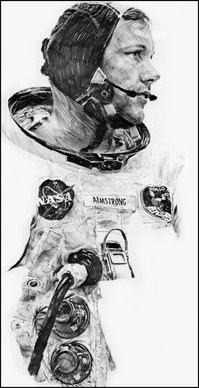The word “hero” gets tossed around a lot these days, but it’s oftentimes not really deserved, in my opinion. That’s not to disparage anyone, or diminish whatever it is that they do. Rather, it’s the word that has been diminished in recent years, through overuse and misuse. One can do admirable things without being a hero. And there’s a lot more to being a hero than simply taking a particular job or wearing a particular uniform. In my mind, “hero” is a description that ought to be reserved for the truly exceptional, people who not only do great things but have a certain quality of character as well.
Just about every article and note of remembrance I’ve read about Neil Armstrong, who died Saturday at the age of 82, has described him as a hero. In his case, I’d say the word is entirely appropriate. Not just because he was arguably the most famous astronaut in the history of manned spaceflight… although I believe he most likely is. And also not just because he was an incredible pilot who saved two spacecraft during his astronaut career: first, the Gemini VIII capsule which tumbled out of control after a thruster malfunctioned, and then the lunar module that carried him and Buzz Aldrin to the Sea of Tranquility. (I don’t know if this is well known outside the space-nerd community, but the LM’s computer was overwhelmed with incoming data and kept shutting down, and was also trying to steer the craft toward a boulder field, so Armstrong took manual control and flew around until he spotted a safe landing site, finally bringing the LM down with only 30 seconds of fuel remaining.) His crewmates on those occasions both described him performing with an almost preternatural calm and grace under pressure. But those characteristics don’t make him a hero either; they just indicate he was very good at his job.
I don’t even think he was heroic for being the first human being in the history of our species to set foot on a planetary body other than the earth. Although that’s certainly a great deed, there wasn’t anything about Armstrong himself that led to him being that man. It could just as easily have been Aldrin who was selected to exit the LM first… or it could have been any of the other Apollo astronauts if the crew rotations and mission plans had gone differently. It very likely would have been Gus Grissom if the Apollo 1 fire hadn’t occurred.
What made Armstrong a true hero, in my book, was the way he responded to becoming that historic figure. His famous words about small steps and giants leaps — reportedly composed by Armstrong himself on the way to the moon, and not ahead of time by a professional speech writer or NASA PR flack — were not political or nationalistic or self-aggrandizing, as they easily could have been. Rather, he spoke on behalf of the entire human race, and beautifully so. And when he returned home, he displayed great humility and self-deprecation in his decision to stay out of the spotlight as much as possible. He could have used his position in the history books for personal advantage, parlaying his fame into political appointments or movie roles or high-paying endorsement deals. Or he could’ve simply become an insufferable braggart. To my knowledge, though, he never even tried to get so much as a free beer in a small-town tavern. Many people were puzzled and frustrated by his efforts to live under the radar, as he routinely turned down requests for interviews and personal appearances, and eventually even autographs. Personally, I admire him for it. I don’t read his reticence as reluctance to own the “first man on the moon” title, or as an urge to hide from the public. Rather, I think he was wise enough to understand that he was merely a human being, and that the historical Neil Armstrong, the one who will live on in legends and fuzzy black-and-white video recordings centuries after the actual man is forgotten, would be impossible to actually live up to. He receded from the public eye both for his own good and for ours, to save us from the disappointment of learning he wasn’t a superman or a demigod, but merely a guy from Ohio. A guy who couldn’t have become that legendary moonwalker without the assistance of thousands of others. I see his years of obscurity as another kind of selfless act, akin to the same selflessness he displayed at the moment he dropped off the LM’s ladder into the unknown powdery soil of our nearest cosmic neighbor. He was a hero precisely because he never tried to be a hero.
He was certainly a hero to me. I wish I’d had an opportunity to meet him. To shake his hand and maybe ask him how his crops were faring. (He spent his later years raising cattle and corn on a 300-acre ranch outside Cincinnati. Talk about coming back down to Earth.) And even though he wouldn’t have asked me to buy him a beer, I most certainly would have. The man did walk on the frackin’ moon, after all…
***
Image: a 1969 sketch by Paul Calle, courtesy of The Pictorial Arts.


